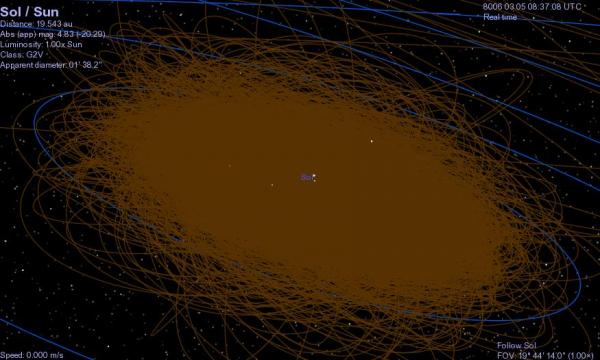BY LETTER
Belt, Asteroid
A typical asteroid belt; asteroid orbits in the Old Solsys Belt |
 Image from Steve Bowers |
Generally, a band of asteroids which encircles a star, often where a planet would normally have formed. It may form the main "world" in a stellar system, as in the Barnard Belt, or it may simply be a region between planets where no planet coalesced, as in the Sol Belt.
Asteroids belts have a number of possible origins. Generally, a planet failed to coalesce during the formation of its star system, usually because of gravitational forces from a nearby gas giant, or because of the disruptive influence of multiple stars (Belts are for this reason far more common in systems with multiple suns than in one star systems).
Much more rarely, a planet has been torn apart by tidal forces, leaving a path of scattered debris. There are also a few instances when "planet-buster" weapons were used, such as Muno Gamma, destroyed by Geminga Orthodoxy during the Second Empires War.
Asteroid belts usually include several thousand asteroids, along with billions of smaller fragments, some as tiny as grains of dust, which are often the result of collisions between asteroids. Because of the ease of extracting resources, asteroid belts are highly sought after by developers.
Related Articles
- Asteroid
- Asteroid Mining, Belt Mining
- Barnard Belt
- Belter - Text by M. Alan Kazlev
[1] Any resident of an asteroid belt, including citizens of civilised belts such as the Barnard Belt, Sol Main Belt, the Mirthsen-Simoris Spinward Marches, or any of the other innumerable belts in known space. Many belters have never been in a spaceship, let alone set foot on a planet or large orbital.
[2] Historical/Obsolete - A person who practiced the profession of asteroid prospector and miner (belt mining), usually working alone or with a small number of partners. - Kuiper Belt
- Oort Cloud
- Sol Asteroid Belt
Appears in Topics
Development Notes
Text by M. Alan Kazlev
Initially published on 08 October 2001.
Initially published on 08 October 2001.






